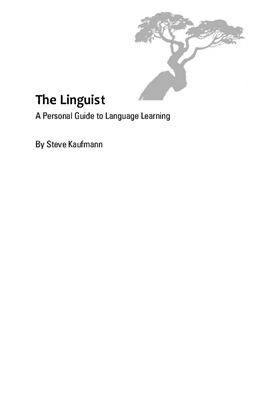The Linguist Institute, 2003, ISBN: 0973339403, 146 pages, PDF, 1,2
MB
It is now a clich? that the world is a smaller place. We think nothing of jumping on a plane to travel to another country or continent. The most exotic locations are now destinations for mass tourism. Small business people are dealing across frontiers and language barriers like never before. The Inteet brings different languages and cultures to our finger-tips. English, the hybrid language of an island at the weste extremity of Europe seems to have an unrivalled position as an inteational medium of communication. But historically periods of cultural and economic domination have never lasted forever. Do we not lose something by relying on the wide spread use of English rather than discovering other languages and cultures? As citizens of this shrunken world, would we not be better off if we were able to speak a few languages other than our own? The answer is obviously yes. Certainly Steve Kaufmann thinks so, and in his busy life as a diplomat and businessman he managed to lea to speak nine languages fluently and observe first hand some of the dominant cultures of Europe and Asia. Why do not more people do the same? In his book The Way of The Linguist, A language leaing odyssey, Steve offers some answers. Steve feels anyone can lea a language if they want to. He points out some of the obstacles that hold people back. Drawing on his adventures in Europe and Asia, as a student and businessman, he describes the rewards that come from knowing languages. He relates his evolution as a language leaer, abroad and back in his native Canada and explains the kind of attitude that will enable others to achieve second language fluency. Many people have taken on the challenge of language leaing but have been frustrated by their lack of success. This book offers detailed advice on the kind of study practices that will achieve language breakthroughs
It is now a clich? that the world is a smaller place. We think nothing of jumping on a plane to travel to another country or continent. The most exotic locations are now destinations for mass tourism. Small business people are dealing across frontiers and language barriers like never before. The Inteet brings different languages and cultures to our finger-tips. English, the hybrid language of an island at the weste extremity of Europe seems to have an unrivalled position as an inteational medium of communication. But historically periods of cultural and economic domination have never lasted forever. Do we not lose something by relying on the wide spread use of English rather than discovering other languages and cultures? As citizens of this shrunken world, would we not be better off if we were able to speak a few languages other than our own? The answer is obviously yes. Certainly Steve Kaufmann thinks so, and in his busy life as a diplomat and businessman he managed to lea to speak nine languages fluently and observe first hand some of the dominant cultures of Europe and Asia. Why do not more people do the same? In his book The Way of The Linguist, A language leaing odyssey, Steve offers some answers. Steve feels anyone can lea a language if they want to. He points out some of the obstacles that hold people back. Drawing on his adventures in Europe and Asia, as a student and businessman, he describes the rewards that come from knowing languages. He relates his evolution as a language leaer, abroad and back in his native Canada and explains the kind of attitude that will enable others to achieve second language fluency. Many people have taken on the challenge of language leaing but have been frustrated by their lack of success. This book offers detailed advice on the kind of study practices that will achieve language breakthroughs

